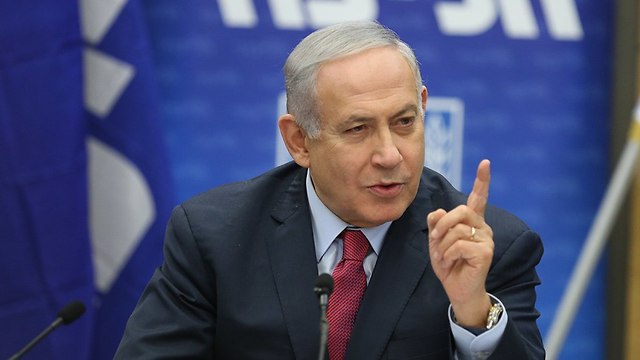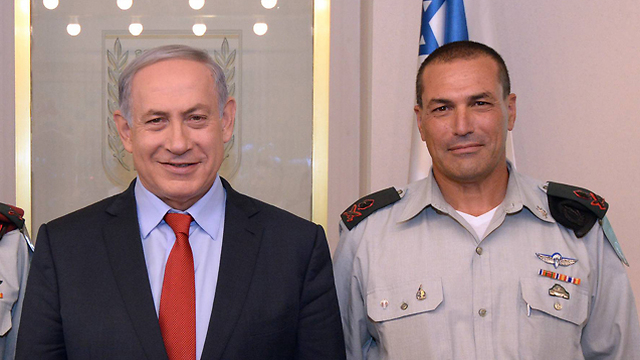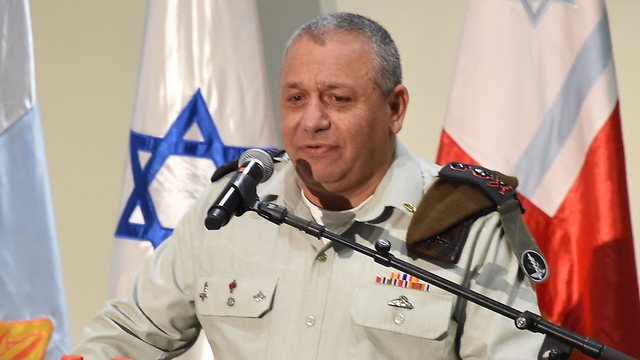
Netanyahu’s challenges as defense minister and right-wing leader
Op-ed: Stabilizing the Gaza border while appeasing the right wing is not an easy task, which might lead Netanyahu to either avoid making required decisions altogether or blame the failures on the outgoing and incoming chiefs of staff.
"I'm only the president, how do you manage to be the prime minister, the foreign affairs minister, the defense minister, the health minister, and the immigrant absorption minister?" Putin would have asked Netanyahu.
Netanyahu would have thanked Putin for the compliment. "My enemies say Israel is going through a Putinization process. That's nonsense. Russia is going through a Bibization process. Go and learn," the prime minister would have added.
Netanyahu approved Wednesday the appointment of Maj. Gen. Eyal Zamir as IDF deputy chief of staff. Netanyahu's speech during the General Staff meeting photographed well, with Gaza as the top priority on the agenda, rather than a possible war on the northern front—which only several days ago was described by the prime minister so vivdly—you would think it has already begun.
I accompanied Zamir during the first months of the Gaza border riots. We've spoken quite a bit. He is a professional, prudent, experienced, and stately IDF officer. Netanyahu harmed him by pushing for his appointment before his time.
Zamir's competitor, Maj. Gen. Nitzan Alon, is no less professional, experienced, and stately. Alon is a brilliant man. Unfortunately for him, he served as the GOC Central Command.
After working to enforce the law in the West Bank, Alon became the settlers' enemy. It is hard to say whether the false propaganda spread by the most radical of settlers tipped the scales against him, or whether Zamir's virtues influenced the final decision.
Prime ministers have insisted to hold the defense portfolio even before Netanyahu. They mainly did it to prevent others from assuming the very important post of defense minister to be used as a counterbalance.
The classic example for this is Shimon Peres during Yitzhak Rabin's first government. Rabin learned his lesson, and appointed himself as the defense minister during his second government.
But this is not Netanyahu's problem at the moment. The defense minister's first task is to stabilize the situation on the Gaza border, and the decisions required to achieve this goal will not be to the liking of the right wing.
Netanyahu needs someone to separate between him and the decision-making. After keeping the defense portfolio to himself, during election time, there are two options left: either the required decision will not be taken, or the blame will be placed on the outgoing and incoming chief of staff's shoulders.
Outgoing Chief of Staff Gadi Eisenkot has already been labeled as the nation's enemy. Sooner or later it will happen to incoming chief of staff Aviv Kochavi as well.
The good news is that both Eisenkot and Kochavi do not owe their appointment to anyone. Netanyahu's selection process was swift and nonbinding. They were appointed on their own merits. I hope Zamir will think that as well.
Eisenkot will conclude his tenure on December 31st. His term as chief of staff was supposed to be extended by a year, but he renounced it willingly, which is another reason to think highly of him.
As opposed to outgoing Police Commissioner Roni Alsheikh—who waged a desperate campaign to extend his tenure, as well as against his successor—Eisenkot asked to shorten his term rather than to prolong it.
I think it is safe to say that Eisenkot prevented three bloody military campaigns during his time as chief of staff—the first one being on the northern front, the second in the West Bank and the third in Gaza. He did it through an extensive and bold special forces' activity across the border and far-reaching reforms in the IDF. It is a shame that citations are not given for war prevention.













